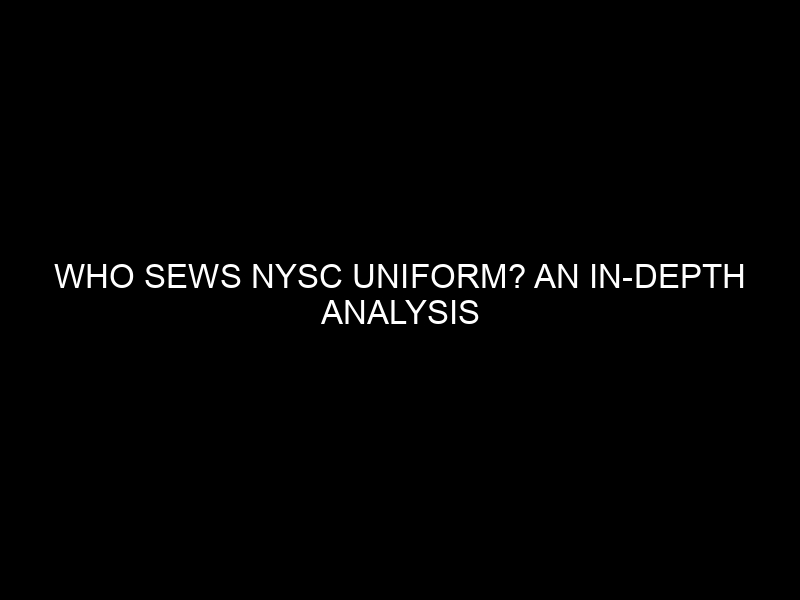The National Youth Service Corps (NYSC) remains a cornerstone of post-tertiary engagement for Nigerian graduates, drawing diverse citizens into a tapestry of cultural and developmental exchange. Central to this immersive experience is the NYSC uniform, a symbol of unity, discipline, and equality among Nigerian youth. However, behind the iconic khaki ensembles and crested vests, a question often lingers, subtly yet persistently: who exactly sews NYSC uniforms? This article delves into the intricacies of the production process, the stakeholders involved, and the quality and ethical considerations that accompany the creation of these emblematic outfits.
The Genesis of NYSC Uniforms: A Historical Framework
The NYSC scheme, established post-civil war in 1973 under General Yakubu Gowon’s regime, was a strategic initiative to reconstruct, reconcile, and rebuild the country after the fractures of the conflict. The uniform, introduced as a standard kit for all corps members, was not just attire but a national emblem of service and integration. Originally, these uniforms were mass-produced by select government-contracted apparel manufacturers, ensuring consistency and adherence to the specifications laid out by the NYSC’s governing body.
The Contemporary Process: From Fabric to Fatigues
Today, the process of making NYSC uniforms involves various certified stakeholders. The NYSC, under the supervision of the Ministry of Youth and Sports Development, typically issues tenders for uniform production. These tenders are rigorous, requiring manufacturers to demonstrate not only capacity but also a commitment to quality, ethical labor practices, and timely delivery.
The chosen manufacturers source high-grade materials designed for durability and comfort in the diverse Nigerian climate. While the NYSC maintains strict quality control at every stage, the actual sewing has been decentralized over the years, involving several small to medium scale enterprises across the nation. This strategy, confirmed by a report from the Manufacturing Association of Nigeria (MAN), is in line with the government’s policy to promote local content and empower indigenous industries.
Quality Control: Ensuring Standardization and Comfort
The standardization of NYSC uniforms is paramount, given their symbolic significance and the practical demands placed on them by corps members’ various activities. To this end, the NYSC has instituted a Quality Control and Assurance Department, working in concert with the Standards Organisation of Nigeria (SON), to enforce adherence to predefined standards.
These uniforms undergo rigorous testing for colorfastness, tensile strength, and durability. The feedback from corps members, collated through regular surveys conducted by the NYSC, plays a crucial role in continual quality improvement, ensuring the uniforms meet the wearers’ practical needs and aesthetic expectations.
Ethical Considerations and Community Impact
The decentralized production of NYSC uniforms has socioeconomic implications. By engaging local tailoring outfits and fabric suppliers, the NYSC, according to the Small and Medium Enterprises Development Agency of Nigeria (SMEDAN), fosters job creation and skills transfer. However, this decentralization raises questions about fair labor practices and sustainability.
The NYSC’s code of conduct, in alignment with the International Labour Organization’s (ILO) standards, mandates contracted manufacturers to uphold ethical labor practices, including fair remuneration, reasonable work hours, and a safe working environment. Regular audits and surprise inspections help ensure compliance, as noted in the NYSC’s annual reports.
The Future of NYSC Uniforms: Innovation and Sustainability
Looking ahead, the conversation around the production of NYSC uniforms is shifting towards sustainability. Innovative ideas, such as the use of eco-friendly fabrics and renewable energy in production, have been mooted in various stakeholder meetings, including those held by the Federal Ministry of Environment.
Moreover, there’s growing advocacy for adaptive clothing technology to make uniforms more suitable for persons with disabilities, championed by inclusive organizations like the Joint National Association of Persons with Disabilities (JONAPWD). These prospective changes reflect a broader commitment to social responsibility and inclusivity.
Conclusion
The production of NYSC uniforms is a process that upholds not only the sartorial dignity of corps members but also the economic and ethical standards of the nation. From the tenders issued by the NYSC to the local tailors and fabric suppliers, each stitch contributes to a narrative of national pride, unity, and collective development. As we look to the future, the continued innovation and sustainability in the production of these uniforms will remain a testament to Nigeria’s unwavering commitment to its youth and national development.
FAQs
Can NYSC Members Sew Their Own Uniforms?
No, corps members cannot sew their own uniforms. The NYSC stipulates that all uniforms must be produced by its authorized manufacturers to ensure consistency and quality control. Members are, however, permitted minor adjustments for fit.
How Are NYSC Uniform Manufacturers Selected?
Manufacturers are selected through a competitive tender process that assesses their capacity, commitment to quality, adherence to ethical labor standards, and previous performance, if applicable. This process is supervised by the NYSC in collaboration with relevant regulatory bodies.
Are There Penalties for Non-compliance by Manufacturers?
Yes, manufacturers who fail to meet the stipulated standards face penalties, including fines, suspension of contracts, or blacklisting, as per the NYSC’s contractual agreements and the Nigerian legal framework.
Can International Firms Produce NYSC Uniforms?
The preference is given to Nigerian firms in line with the government’s local content policy. However, international firms can participate in the bidding, provided they meet the requirements and demonstrate a clear strategy for local partnership and skills transfer.
References:
- National Youth Service Corps (NYSC) – History and Mandate. NYSC.gov.ng
- Manufacturing Association of Nigeria (MAN) – Reports on Local Content in Manufacturing.
- Small and Medium Enterprises Development Agency of Nigeria (SMEDAN) – Impact Reports.
- Standards Organisation of Nigeria (SON) – Quality Control Parameters.
- Federal Ministry of Environment – Policies on Sustainable Manufacturing.
- International Labour Organization (ILO) – Standards on Ethical Labour Practices.
- Joint National Association of Persons with Disabilities (JONAPWD) – Advocacy for Inclusive Uniforms.

